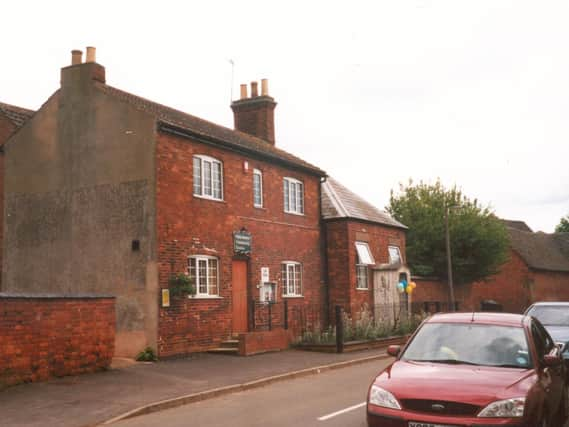Former Advertiser reporter remembers Mrs James' strict school dinner regime and the Patchett’s touring fish van


She rounded the corner, her 1950s dresses billowing in the wind like the sails of a 19th century schooner ploughing through the Atlantic waves.
Her face was little more than an expressionless, painted figurehead, the make-up appearing as if it had been applied with a broom and bucket rather than by human hand.
Advertisement
Hide AdAdvertisement
Hide AdUnsmiling, she glanced for a moment at her charges on the playground at Churchover Parochial School, swept through the washroom door… and then was gone.
Did I say schooner? Oh no, that doesn’t really do her justice. For Mrs James was more like one of Nelson’s men o’ war, with the long barrels of sharpshooters’ muskets gleaming in the topsails and lines of cannon bristling along her bows.
Mrs James. I have no more idea as to what was her Christian name, any more than I knew the first name of her predecessor, Mrs Perrott. Or Mrs Clowes, for that matter.
Small children in those days had to know their place in the scheme of things. And that was very low down the food chain indeed. Speak when spoken to, put your hand up first if you have a question, and be warned – there IS such a thing as dumb insolence.
Advertisement
Hide AdAdvertisement
Hide AdThere was no escape, no hiding place. I don’t know whether Mrs James was related to Jesse James, but I’m willing to bet that the notorious American outlaw was nowhere near as frightening.
Mrs James had many rules, but there was one that could never be broken. And that related to school dinners. Every single, minute, microscopic morsel had to be eaten, nothing was to be left.
I soon fell foul of this regime. Even though, like many children in those days I ate more or less everything that was put in front of me, I could not stomach gristle.
One day, I left a piece of gristly meat on my plate. Mrs James spotted it and boomed: “You will eat up ALL your food, John Phillpott. Think of all those poor starving children in Abyssinia and Ceylon – they would be very grateful indeed for that perfectly fine food you’re wasting!”
Advertisement
Hide AdAdvertisement
Hide AdThat afternoon I was made to sit at my desk with the plate, the piece of gristly meat slowly congealing in its own fat, like some awful ice-bound wreck of a ship surrounded in a frozen sea of white.
Eventually, and in desperation, I tried to eat it. And then almost threw up.
However, I don’t hold any grudges against Mrs James, any more than I agree with the current fashionable viewing of the events of long ago through a modern day moral prism.
What’s happened is history. It’s gone. Mrs James would have lived through the Second World War with all its terror, misery and privations.
Advertisement
Hide AdAdvertisement
Hide AdWasting food was out of the question. And it remained that way, even as the more prosperous 1950s got underway.
Anyway, do you remember Patchett’s the fishmongers? I bet you do. At one time, the firm’s premises were near Over’s book and stationery shop opposite Rugby Clocktower.
I remember as a small boy being fascinated by all the different species on offer. This was in the days when British people loved to eat all manner of fish, and it was possible to see plaice, skate, brill, cod, haddock and herrings on sale.
My parents bought me the Observer’s Book of Sea Fishes, such was my interest.
Advertisement
Hide AdAdvertisement
Hide AdIn those days, Patchett’s van used to call at all the villages, usually on a Tuesday, as there were no fish available for sale on Mondays. That’s why we always ate herrings on a Tuesday, because they were still very fresh and silvery, as if they had just been plucked from the sea.
I remember my mother saying that the eyes should be red and moist. It was a sign that they’d not long been caught. Fried in flour and pepper, they were delicious. Sadly, you very rarely see them now.
Also making the rounds of the villages around Rugby in those days were the mobile library and a chap who drove a flatbed truck loaded with fizzy drinks.
Churchover children just knew him as ‘The Pop Man,’ and when his lorry came trundling down School Street, we would run after him chorusing ‘Pop man, pop man, have you any pop man?”
Advertisement
Hide AdAdvertisement
Hide AdWhen I started at Lawrence Sheriff I often wished I’d been brought up a Catholic, for pupils of that faith were always served fish on Fridays. This always looked more appetising than the mutton, mash and cabbage swimming in globules of fat gravy that the rest of us were given.
The dining room was at Penrhos House on the corner of Clifton Road and Moultrie Road. I can see those big metal containers now, packed to the brim with cheap cuts of meat, overcooked carrots or greens that were actually grey.
Mind you, there was at least one good thing about it. Mrs James was nowhere to be seen…
John Phillpott has written about the days of his childhood and youth in Beef Cubes and Burdock and Go and Make the Tea, Boy! both available at bookshops or on the internet.